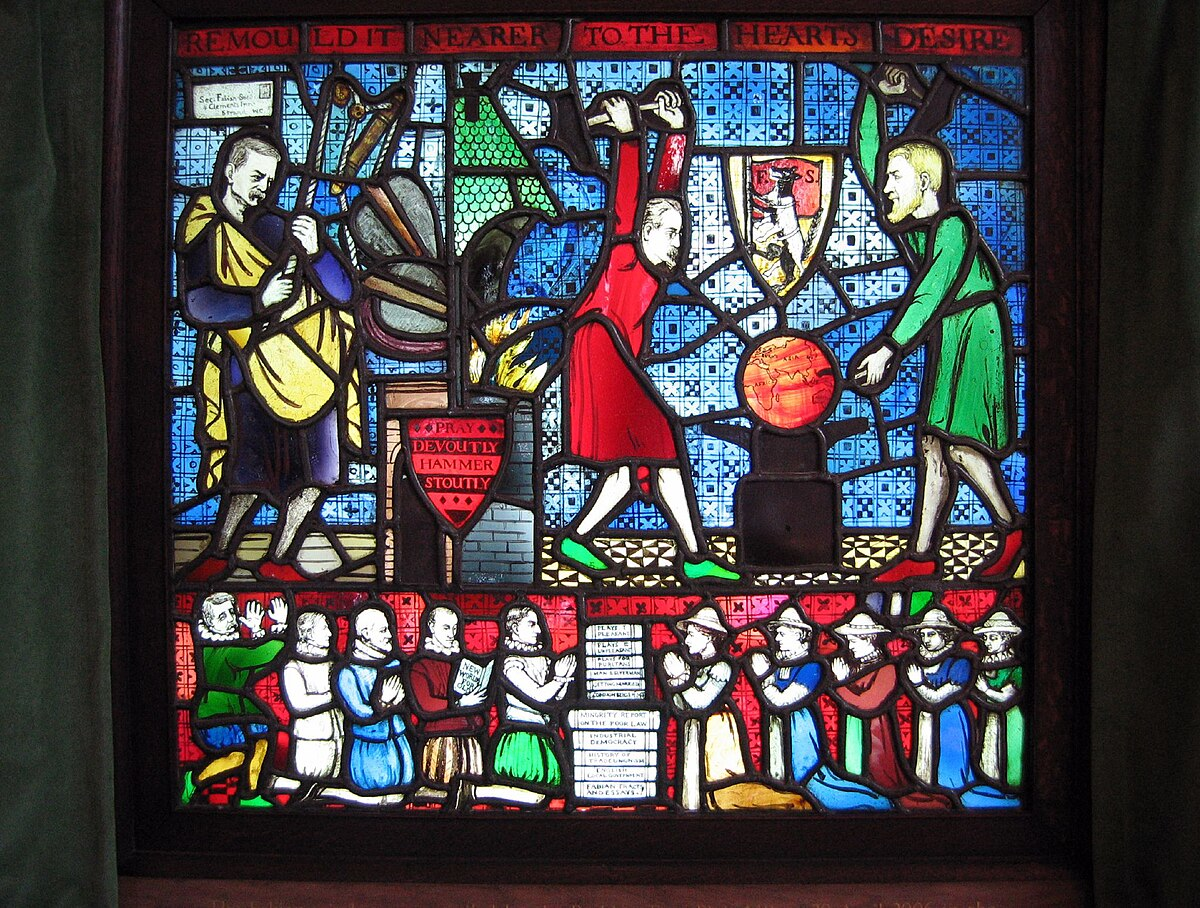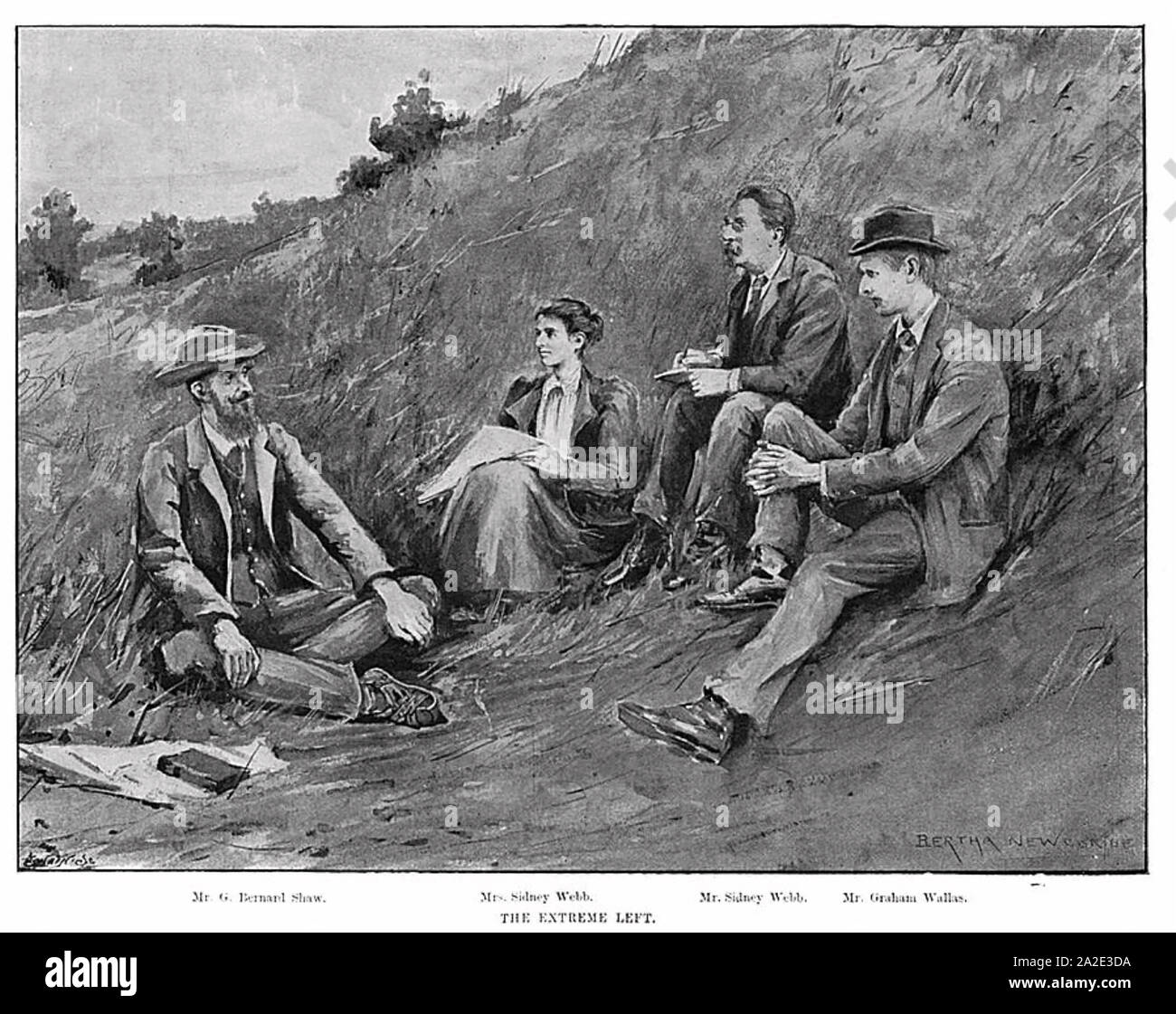The Fabian Society: A Comprehensive Analysis of Britain’s Oldest Socialist Think Tank
The Fabian Society stands as one of the most enduring and influential political organizations in British history, having shaped progressive politics for over 140 years. Founded on 4 January 1884 as an offshoot of the Fellowship of the New Life, the Society has evolved from a small group of Victorian intellectuals into a major force within the Labour movement, maintaining its commitment to gradual socialist reform through democratic means. This comprehensive examination explores the Society’s origins, structure, influence, controversies, and contemporary role in British politics.

The Fabian Window stained glass artwork symbolizing the Fabian Society’s reformist ideals and historical legacy
Historical Origins and Founding Philosophy
The Fellowship Connection and Early Formation
The Fabian Society emerged from the Fellowship of the New Life, a utopian organization founded by Scottish philosopher Thomas Davidson. While the Fellowship focused on individual moral transformation and simple living, the Fabians believed that societal change required political action and systematic reform rather than personal example alone. This philosophical divergence led to the formation of the Fabian Society on 4 January 1884, with nine founding members: Frank Podmore, Edward R. Pease, William Clarke, Hubert Bland, Percival Chubb, Frederick Keddell, H. H. Champion, Edith Nesbit, and Rosamund Dale Owen.
The Society’s name derives from the Roman general Quintus Fabius Maximus Verrucosus, nicknamed “Cunctator” (the Delayer), whose strategy of patience and gradual warfare against Hannibal provided the philosophical foundation for Fabian gradualism. The first Fabian pamphlet articulated this approach: “For the right moment you must wait, as Fabius did most patiently, when warring against Hannibal, though many censured his delays; but when the time comes you must strike hard, as Fabius did, or your waiting will be in vain, and fruitless”.

Cover of the 1889 Fabian Essays in Socialism, illustrating key socialist themes by Walter Crane
The Intellectual Powerhouse: Key Early Figures
The Society quickly attracted some of the most brilliant minds of late Victorian Britain. George Bernard Shaw joined in 1884 and became a driving force, editing the influential Fabian Essays in Socialism published in 1889. This collection, which sold over 27,000 copies, established the Fabians as serious intellectual contributors to socialist thought. Shaw’s commitment to developing socialist theory distinguished him from his more pragmatic colleagues.
Sidney Webb and Beatrice Webb emerged as the Society’s most significant figures, developing both the intellectual framework and research methodology that characterized Fabian thinking. Sidney Webb’s statistical approach helped establish the modern think tank model, with Fabians systematically collecting data from government sources to build evidence-based cases for socialist reform. Beatrice’s 1909 Minority Report to the Commission of the Poor Law laid crucial groundwork for the welfare state.

Early 20th-century depiction of Fabian Society founding members George Bernard Shaw, Sidney Webb, Beatrice Webb, and Graham Wallas gathered outdoors
Other prominent early members included Graham Wallas, Annie Besant, Sydney Olivier, and later H.G. Wells. These individuals represented a new type of socialist intellectual—university-educated, middle-class reformers who rejected revolutionary Marxism in favor of evolutionary change through existing institutions.
Organizational Structure and Membership
Democratic Governance and Executive Framework
The Fabian Society operates as a democratic membership organization with a complex but transparent governance structure. The executive committee consists of 22 members maximum, including 10 elected ordinary members, three representatives from local Fabian societies, and designated representatives from Scottish Fabians, Welsh Fabians, Young Fabians, and the Fabian Women’s Network. This structure ensures representation across geographic and demographic lines while maintaining central coordination.
Elections are held biennially, with the committee selecting its own chair and officers annually. The current chair is Martin Edobor, reflecting the Society’s efforts to diversify its leadership. The organization maintains strict rules about collective policy positions, with a self-denying ordinance stating that “no resolution of a political character expressing an opinion or calling for action, other than in relation to the running of the Society itself, shall be put forward in the name of the Society”. This allows individual members and authors to express diverse viewpoints without binding the organization to specific policy positions.
Membership Categories and Requirements
The Society offers two primary membership categories with distinct requirements and privileges. Full membership requires individuals to identify as socialist, be eligible for Labour Party membership, not belong to parties opposing Labour (except the Co-operative Party), and commit to promoting Fabian aims. Full members receive voting rights and become affiliated supporters of the Labour Party if they are not already members.
Associate membership is available for those in general sympathy with Fabian aims but who either do not desire or are ineligible for full membership. This category accommodates international members and those affiliated with other political parties.
Current membership exceeds 7,000 people, representing the Society’s highest membership levels in decades. Approximately 80% of members also belong to the Labour Party, reflecting the close but not exclusive relationship between the organizations.
Subsidiary Organizations and Networks
The Society operates several autonomous subsidiary groups that organize their own activities while remaining connected to the central organization. The Young Fabians serve members under 31 years old, functioning as both a recruitment mechanism and incubator for new political talent. Originally established in 1960, the Young Fabians have produced numerous pamphlets and played significant roles in Labour Party modernization.
The Fabian Women’s Network includes all female members and operates with its own elected executive committee. Founded in 2005 by Labour MP Seema Malhotra, the network has grown to over 2,000 members and runs a prestigious mentoring program. Since 2011, this program has supported 348 women through its 10-month development process, producing six elected Labour MPs, 80 local councillors, and 12 charity CEOs.
Scottish Fabians and Welsh Fabians provide regional coordination and policy development tailored to devolved governance structures. These groups maintain their own constitutions and activities while contributing representatives to the national executive committee.
Local Fabian societies operate in 45 locations across the UK, with some dating back to the 1890s. These groups, affiliated to both the national Fabians and often their local Labour parties, provide grassroots engagement and policy discussion at the community level.
Institutional Legacy and Major Achievements
The London School of Economics: Academic Influence
Perhaps the Fabians’ most enduring institutional legacy is the London School of Economics and Political Science, founded in 1895. The LSE emerged from a breakfast meeting on 4 August 1894 between four Fabian executive committee members: Sidney and Beatrice Webb, Graham Wallas, and George Bernard Shaw. Using a £20,000 bequest left to the Fabian Society by Derby solicitor Henry Hutchinson, they established an institution dedicated to advancing social science education and addressing societal problems.

The Old Building entrance of the London School of Economics, connected historically to the Fabian Society’s founding
The LSE quickly became a globally prestigious university, maintaining connections to Fabian academics including Harold Laski, Richard Titmuss, and Brian Abel-Smith. Today, the LSE houses the Fabian Society archives and the famous Fabian Window, a stained-glass artwork designed by George Bernard Shaw depicting early Fabian ideals.
The New Statesman: Media and Cultural Influence
The Fabians’ media influence crystallized with the founding of The New Statesman magazine in 1913. Conceived by Sidney and Beatrice Webb with financial support from George Bernard Shaw and other Fabians, the magazine aimed to provide independent left-wing analysis beyond party politics. Under founding editor Clifford Sharp, the magazine gained international attention, particularly with Shaw’s anti-war supplement “Common Sense About The War” in 1914, which sold 75,000 copies.
While The New Statesman gradually became editorially independent from the Fabian Society, it remains a significant voice in British progressive politics. The magazine’s longevity and influence demonstrate the Fabians’ success in creating lasting institutions that extend their intellectual impact beyond direct political activity.
Labour Party Foundation and Political Integration
The Fabian Society played a crucial role in founding the Labour Party in 1900, joining with trade unions and other socialist organizations to create the Labour Representation Committee. Unlike other founding organizations that have since disappeared or changed dramatically, the Fabian Society remains affiliated to Labour in its original form.
This relationship has provided the Fabians with unique access and influence within Labour politics. Every Labour Prime Minister has been a Fabian Society member, from Ramsay MacDonald and Clement Attlee through Harold Wilson and Tony Blair to Gordon Brown. The 1945 Labour landslide elected 229 Fabian MPs, leading observer Zena Parker to comment that the Parliamentary Labour Party looked “like an enormous Fabian School”.
Contemporary Role and Modern Influence
Policy Development and Think Tank Activities
The modern Fabian Society functions as both a membership organization and a professional think tank, publishing research reports, policy pamphlets, and the quarterly Fabian Review. The Society’s research covers diverse areas including economics, health policy, education, constitutional reform, and international affairs. Recent publications have addressed pension reform, employment rights, arts policy, and social care.
The Society’s influence extends through its close relationships with Labour politicians. Under Keir Starmer’s leadership, over half the Shadow Cabinet are Fabian members, including prominent figures like Angela Rayner and Rachel Reeves. Starmer himself served on the Fabian executive committee before becoming Labour leader, representing the closest institutional relationship between the Society and Labour leadership in decades.
Research Methodology and Evidence-Based Advocacy
Building on Sidney Webb’s legacy, the Society maintains its commitment to empirical research and evidence-based policy development. The professional staff team, led by General Secretary Andrew Harrop (recently succeeded by Joe Dromey), conducts original research, organizes policy commissions, and facilitates expert discussions. This approach distinguishes the Fabians from more ideological think tanks by emphasizing practical solutions grounded in data analysis.
The Society’s policy groups bring together members with relevant professional expertise to examine specific issues in detail. These groups operate autonomously while contributing to the broader Fabian program of research and debate.
Criticisms, Controversies, and Conspiracy Theories
Historical Problematic Views and Positions
The Fabian Society has acknowledged that many early members held views incompatible with contemporary values and the Society’s stated commitments to equality. Leading members engaged with eugenics theories, held racist prejudices toward Jewish, Black, and Asian populations, and expressed varying views on British imperialism. The Society’s support for Britain in the Boer War created significant controversy and led to departures of members including Emmeline Pankhurst.
These historical positions reflect the broader intellectual climate of late Victorian and Edwardian Britain rather than unique Fabian failings. However, they complicate the Society’s progressive legacy and have required honest acknowledgment in contemporary historical assessments.
Modern Criticisms and Elite Perceptions
Contemporary critics often characterize the Fabian Society as representing middle-class, professional socialism rather than authentic working-class interests. This “soulless wonk” criticism suggests that Fabians prioritize technocratic solutions over transformative political change. Such criticisms intensified during the New Labour period when Fabian-associated policies were seen as insufficiently radical by some on the left.
The Society’s membership composition—heavily weighted toward educated professionals, academics, and political practitioners—reinforces perceptions of elitism. Critics argue that despite socialist rhetoric, the Fabians represent establishment interests rather than challenging existing power structures.
Conspiracy Theories and Misrepresentations
The Fabian Society has become a target for various conspiracy theories, often focused on the historical “wolf in sheep’s clothing” imagery from the Society’s early coat of arms. Right-wing conspiracy theorists have portrayed the Fabians as a secretive organization plotting socialist world government. These theories typically misrepresent the Society’s transparent operations and democratic structure.

The coat of arms of the Fabian Society featuring a wolf in sheep’s clothing holding a red flag with initials F.S
Academic analysis reveals that such conspiracy theories serve ideological purposes rather than reflecting factual understanding of Fabian activities. The Society’s extensive public documentation, democratic governance, and open membership contradict claims of secretive manipulation.
More measured critics acknowledge the Society’s influence while questioning whether gradual reform can address systemic inequalities effectively. These substantive critiques focus on strategic effectiveness rather than alleging conspiratorial behavior.
Benefits and Value Proposition for Members
Educational and Professional Development
Fabian membership provides substantial benefits for individuals interested in progressive politics and policy development. Members receive quarterly publications including the Fabian Review and research reports delivered to their homes. The Society organizes conferences, speaker events, and policy discussions throughout the UK, offering reduced-price admission for members.
The networking opportunities are particularly valuable for political and policy careers. Members gain access to senior politicians, policy experts, and like-minded individuals across the UK through local society meetings and national events. For many members, these connections prove crucial for career development in politics, policy, and related fields.
Democratic Participation and Influence
Unlike traditional think tanks, the Fabian Society offers members genuine opportunities to influence organizational direction and contribute to policy development. The democratic structure allows members to elect executive committee representatives and participate in policy group activities. Young Fabian and Fabian Women’s Network programs provide additional development opportunities and leadership training.
Members not already affiliated with the Labour Party automatically become affiliated supporters with voting rights in Labour leadership elections. This benefit connects Fabian membership to broader political participation and influence within the Labour movement.
International Connections and Global Influence
Decolonization and Commonwealth Relationships
The Fabian Society’s international influence extended significantly during the decolonization period following World War II. Fabian ideas influenced policy development in newly independent countries including India and Singapore. The Colonial Bureau of the Fabian Society, established in 1940, produced extensive analysis of imperial administration and self-government questions.
However, this international engagement reflected the complex and sometimes contradictory Fabian attitudes toward empire and race. While some Fabians supported rapid decolonization, others viewed the British Empire as potentially progressive if properly administered. These tensions illustrate the challenges of applying Fabian gradualism to questions of imperial governance and racial equality.
Contemporary International Networks
The modern Fabian Society maintains international connections through the Fabian International Policy Group, established in 2016. This network brings together members with foreign affairs expertise to analyze global issues and contribute to Labour Party international policy development. The group collaborates with sister organizations worldwide in the renewal of progressive politics.
The Young Fabians operate an International Network focused on promoting ethical foreign policy and building connections with progressive movements globally. These activities reflect the Society’s recognition that contemporary political challenges require international cooperation and coordination.
Assessment of Societal Impact: Positive and Negative Contributions
Positive Contributions to British Democracy
The Fabian Society’s contributions to British political development are substantial and enduring. The Society pioneered evidence-based policy advocacy, establishing research methodologies that became standard practice for modern think tanks. Their statistical approach to social problems provided empirical foundations for welfare state development and progressive reform.
The institutions founded or influenced by Fabians—the LSE, The New Statesman, and the Labour Party—represent lasting contributions to British intellectual and political life. The LSE alone has educated countless world leaders and influenced global policy development far beyond British borders.
The Society’s commitment to democratic socialism and gradual reform provided a viable alternative to both revolutionary Marxism and laissez-faire capitalism. This “third way” approach influenced social democratic movements worldwide and demonstrated that socialist objectives could be pursued through democratic institutions.
Problematic Aspects and Limitations
The Society’s historical engagement with problematic ideologies including eugenics and imperialism cannot be ignored. While these views reflected broader intellectual currents of their time, they contradict the Society’s contemporary commitments to equality and human rights.
The Fabian emphasis on gradual reform and institutional change may have limited more radical transformations of British society. Critics argue that Fabian incrementalism has preserved fundamental inequalities while making them more palatable through modest reforms.
The Society’s middle-class composition and professional orientation may limit its understanding of working-class experiences and priorities. This demographic bias potentially undermines the authenticity of its socialist commitments and policy recommendations.
Conclusion: The Fabian Legacy in Contemporary Politics
The Fabian Society represents one of the most successful examples of sustained political influence through intellectual engagement and institutional development. Over 140 years, the Society has demonstrated remarkable adaptability while maintaining core commitments to democratic socialism and gradual reform.
The Society’s influence on British politics extends far beyond its membership numbers or formal political power. Through the LSE, The New Statesman, and the Labour Party, Fabian ideas have shaped educational, media, and political institutions that continue to influence British society. The evidence-based approach to policy advocacy pioneered by the Fabians has become standard practice across the political spectrum.
However, the Society’s contemporary relevance faces significant challenges. Critics question whether gradual reform can address urgent issues including climate change, inequality, and democratic decline. The Society’s middle-class composition and establishment connections may limit its ability to connect with broader popular movements for change.
The ongoing relationship between the Fabian Society and the Labour Party under Keir Starmer’s leadership suggests continued institutional influence. With over half the Shadow Cabinet holding Fabian membership, the Society is positioned to shape Labour’s policy agenda and potentially government policy if Labour returns to power.
Whether the Fabian Society can adapt its gradualist philosophy to contemporary challenges while maintaining its intellectual rigor and democratic commitments will determine its relevance for future generations. The Society’s historical success in navigating political and intellectual transitions suggests capacity for continued evolution, but the scale and urgency of contemporary challenges may require more fundamental adaptation than previous periods.
The Fabian Society thus remains what it has always been: a fascinating laboratory for progressive political thinking, remarkable for its longevity and institutional success, yet constrained by the very gradualism that has ensured its survival. For investigators of political influence and institutional power, the Fabians offer a complex case study in how intellectual organizations can shape political development over time while remaining embedded within existing power structures rather than challenging them fundamentally
- https://en.wikipedia.org/wiki/Fabian_Society
- https://fabians.org.uk/about-us/our-history/
- https://www.dailysabah.com/arts/fabian-society-roots-theory-and-practice-of-socialist-think-tank/news
- https://heritage.humanists.uk/fabian-society/
- https://radicalteatowel.co.uk/radical-history-blog/the-fabian-society-a-clique-of-bourgeois-socialists/
- https://www.britannica.com/money/Fabianism
- https://slatestarcodex.com/2018/04/30/book-review-history-of-the-fabian-society/
- https://library.fes.de/libalt/journals/swetsfulltext/7379556.pdf
- https://www.britannica.com/topic/Fabian-Society
- https://fabians.org.uk/wp-content/uploads/2022/02/Rules-of-the-Fabian-Society-November-2021.pdf
- https://fabians.org.uk/wp-content/uploads/2024/11/Final-ANNUAL-REPORT-2023-2024-compressed.pdf
- https://fabians.org.uk/membership-terms-and-conditions/
- https://fabians.org.uk/terms-and-conditions-of-membership/
- https://fabians.org.uk/membership/join/why-join-the-fabians/
- https://fabians.org.uk/wp-content/uploads/2023/11/Annual-report-2022-2023-web-v-2.pdf
- https://smartthinking.org.uk/thinktank/fabian-society/
- https://en.wikipedia.org/wiki/Young_Fabians
- https://fabians.org.uk/membership/fabian-women/
- https://www.fabianwomen.org.uk/about
- https://blogs.lse.ac.uk/lsehistory/2021/08/25/meet-our-founders/
- http://www.jceps.com/wp-content/uploads/PDFs/02-2-08.pdf
- https://en.wikipedia.org/wiki/New_Statesman
- https://humancarbohydrate.substack.com/p/5-ways-to-take-the-fabian-society
- https://fabians.org.uk/publications/
- https://www.goodreads.com/book/show/29231543-the-milner-fabian-conspiracy
- https://publicseminar.org/essays/a-secret-invasion/
- https://link.springer.com/10.1007/s11211-021-00376-x
- https://www.science.org/doi/10.1126/science.adq1814
- https://www.lse.ac.uk/south-asia-centre/New-Pages-2020/Fabians-Dialogues
- https://fabians.org.uk/membership/member-interest-groups/fabian-international-policy-group/
- https://www.youngfabians.org.uk/international_network
- https://journals.sagepub.com/doi/10.1177/0047281619873139
- https://visnyk.univd.edu.ua/index.php/VNUAF/article/view/840
- https://esh.kglmeridian.com/view/journals/eshi/43/1/article-p101.xml
- https://www.semanticscholar.org/paper/0337372512616855e9b42a67e5af721daa65f5df
- https://www.taylorfrancis.com/books/9780429608698
- https://journals.qucosa.de/array/article/view/2486
- https://www.semanticscholar.org/paper/df91b2b9cd98c52a93e995932176e06d12038fe5
- https://www.cambridge.org/core/product/identifier/S1053837223000482/type/journal_article
- http://link.springer.com/10.1007/s00234-016-1754-2
- https://journals.uio.no/museolog/article/view/3132
- https://zenodo.org/record/2475956/files/article.pdf
- https://pmc.ncbi.nlm.nih.gov/articles/PMC10111894/
- https://zenodo.org/record/2480981/files/article.pdf
- https://zenodo.org/record/2126579/files/article.pdf
- https://pmc.ncbi.nlm.nih.gov/articles/PMC8563610/
- https://pmc.ncbi.nlm.nih.gov/articles/PMC3175805/
- https://arxiv.org/pdf/2404.02560.pdf
- https://ojs.uclouvain.be/index.php/RETE/article/download/61523/57683
- https://ojs.uclouvain.be/index.php/RETE/article/download/63513/60483
- https://www.mdpi.com/2077-1444/14/5/618/pdf?version=1683345841
- https://fee.org/articles/the-rise-and-fall-of-england-11-the-fabian-thrust-to-socialism/
- https://fabians.org.uk/wp-content/uploads/2021/11/Annual-Report-V4_WEB.pdf
- https://scholar.kyobobook.co.kr/article/detail/4010070218650
- https://ejournal.uki.ac.id/index.php/sp/article/view/5838
- https://dl.acm.org/doi/10.1145/3664647.3681170
- https://academic.oup.com/jcag/article/7/Supplement_1/88/7607691
- https://anzswjournal.nz/anzsw/article/view/821
- http://academicjournals.org/journal/ERR/article-abstract/272666F51901
- https://www.ewadirect.com/proceedings/lnep/article/view/5365
- https://journal.asu.ru/ssi/article/view/15268
- https://bmjopen.bmj.com/lookup/doi/10.1136/bmjopen-2021-060177
- https://journals.sagepub.com/doi/10.1177/01410768211008860
- https://fabians.org.uk/membership-officer-job/
- https://www.reddit.com/r/Ask_Politics/comments/byt6hz/legitimacy_of_the_milnerfabian_conspiracy/
- https://fabians.org.uk/publication/autumn-2024/
- https://academic.oup.com/ia/article/100/1/261/7506716
- http://www.emerald.com/ijem/article/38/6/1649-1666/1231166
- https://academic.oup.com/irap/article/doi/10.1093/irap/lcae018/7917595
- https://wepub.org/index.php/IJSSPA/article/view/4696
- https://link.springer.com/10.1007/978-981-16-6190-7_4
- https://www.allmultidisciplinaryjournal.com/search?q=MGE-2025-2-021&search=search
- https://journals.sagepub.com/doi/10.1177/00208523211000109
- http://journals.sagepub.com/doi/10.1177/22338659211024879
- https://link.springer.com/10.1007/978-3-030-65439-9_14
- https://link.springer.com/10.1007/978-3-030-65439-9_1
- https://www.cambridge.org/core/services/aop-cambridge-core/content/view/066AFEF8CEA16E7F776CC7CFF72927CC/S1740022822000043a.pdf/div-class-title-special-issue-introduction-towards-a-global-history-of-international-organizations-and-decolonization-div.pdf
- https://www.cambridge.org/core/services/aop-cambridge-core/content/view/25C94D96393D4E72CBACBE897B54425F/S0260210520000145a.pdf/div-class-title-power-in-relations-of-international-organisations-the-productive-effects-of-good-governance-norms-in-global-health-div.pdf
- http://journals.sagepub.com/doi/10.1177/13540661221123026
- https://journals.sagepub.com/doi/pdf/10.1177/1354066119873134
- https://zenodo.org/record/1235135/files/article.pdf
- https://www.tandfonline.com/doi/pdf/10.1080/09692290.2023.2249002?needAccess=true&role=button
- https://www.tandfonline.com/doi/pdf/10.1080/13600826.2021.1902284?needAccess=true
- https://www.cambridge.org/core/services/aop-cambridge-core/content/view/A136440CF13EF8C448EE99D2AAC91481/S2057563724000130a.pdf/div-class-title-change-in-international-order-an-institutional-analysis-div.pdf
- https://www.tandfonline.com/doi/pdf/10.1080/20414005.2019.1686866?needAccess=true
- https://jmt.scholasticahq.com/article/117003.pdf
- https://www.graysinn.org.uk/app/uploads/2024/11/Graya-2014-Sidney-Webb.pdf
- https://pmc.ncbi.nlm.nih.gov/articles/PMC3263007/
- https://fabians.org.uk/research/
- https://academic.oup.com/ced/article/50/5/1025/7902052
- https://a916407.fmphost.com/fmi/webd/ASAdb49?script=doi-layout&$SearchString=https://doi.org/10.56315/PSCF9-23Chapman
- https://www.semanticscholar.org/paper/91235fb04ed17184de1be21c14db74cdcb472a0f
- https://a916407.fmphost.com/fmi/webd/ASAdb49?script=doi-layout&$SearchString=https://doi.org/10.56315/PSCF3-25Austin
- https://www.tandfonline.com/doi/full/10.1080/14681366.2021.1948911
- https://link.springer.com/10.1007/s00406-021-01272-w
- https://www.cambridge.org/core/product/identifier/9781139565417%23c03580-1753/type/book_part
- https://www.cambridge.org/core/services/aop-cambridge-core/content/view/CB17D336003DAA3A1B29BD54E4A43418/S1742360022000557a.pdf/div-class-title-cults-conspiracies-and-fantasies-of-knowledge-div.pdf
- https://www.frontiersin.org/articles/10.3389/fpsyg.2013.00406/pdf
- https://journals.sagepub.com/doi/pdf/10.1177/09636625221092145
- https://karolinum.cz/data/clanek/11745/CEJCR_5_1_0099.pdf
- https://pmc.ncbi.nlm.nih.gov/articles/PMC4728076/
- https://journals.sagepub.com/doi/pdf/10.1177/14614448221090201
- https://pmc.ncbi.nlm.nih.gov/articles/PMC9491658/
- https://www.frontiersin.org/articles/10.3389/fpsyg.2017.00861/pdf
- https://misinforeview.hks.harvard.edu/wp-content/uploads/2020/04/FORMATTED_COVID-19_conspiracytheories..pdf
- https://www.mdpi.com/2313-5778/8/2/73/pdf?version=1717671269
- https://www.cambridge.org/core/services/aop-cambridge-core/content/view/CF4793A9C3B063F132B60C2A79E5329E/S1755048324000130a.pdf/div-class-title-religion-spirituality-and-susceptibility-to-conspiracy-theories-examining-the-role-of-analytic-thinking-and-post-critical-beliefs-div.pdf
- https://www.goodreads.com/topic/show/17459724-the-fabian-society
- https://forum.effectivealtruism.org/posts/oDkfxGrT9RfadCNFc/the-fabian-society-was-weirdly-similar-to-the-ea-movement
- https://fabians.org.uk/membership/
- https://fabians.org.uk/building-resilience/
- https://fabians.org.uk/membership-upgrade/?page=CiviCRM&q=civicrm%2Fmembershipupgrade%2Fprecheck&reset=1
- https://scholarlypublishingcollective.org/jmps/article/6/2/191/254745/Recovering-Women-s-History-with-Network-Analysis-A
- https://bmcpregnancychildbirth.biomedcentral.com/articles/10.1186/s12884-020-03321-z
- https://www.cambridge.org/core/product/identifier/S0037677900011645/type/journal_article
- https://www.tandfonline.com/doi/full/10.1080/10448632.2021.1908065
- https://www.cambridge.org/core/product/identifier/S0047279410000875/type/journal_article
- https://linkinghub.elsevier.com/retrieve/pii/S0022316622106437
- https://www.degruyter.com/document/doi/10.1515/9789048543533/html
- https://depositonce.tu-berlin.de/handle/11303/13133
- https://equityhealthj.biomedcentral.com/articles/10.1186/s12939-025-02566-4
- https://www.frontiersin.org/article/10.3389/fpsyg.2018.02690/full
- https://www.frontiersin.org/articles/10.3389/feduc.2021.636067/pdf
- https://journals.sagepub.com/doi/pdf/10.1177/00187267241302783
- https://www.erudit.org/en/journals/atlantis/2023-v44-n2-atlantis09104/1109376ar.pdf
- https://febs.onlinelibrary.wiley.com/doi/10.1002/2211-5463.13933
- https://zenodo.org/record/1704970/files/article.pdf
- http://dspace.stir.ac.uk/bitstream/1893/23210/1/Perriton%20Business%20History%20Text%20Accepted%20.pdf
- https://pmc.ncbi.nlm.nih.gov/articles/PMC7325587/
- https://pmc.ncbi.nlm.nih.gov/articles/PMC7905333/
- https://pmc.ncbi.nlm.nih.gov/articles/PMC9703220/
- https://estudiosmedievales.revistas.csic.es/index.php/estudiosmedievales/article/view/1341
- https://scottish.fabians.org.uk/membership/fabian-women/
- https://fabians.org.uk/fabian-womens-network-executive-committee-elections/
- https://www.fabianwomen.org.uk
- http://www.meam.org.uk/wp-content/uploads/2010/04/Hardest-to-Reach.pdf
- https://decolonisinglse.wordpress.com/2019/09/12/eugenics-and-the-academy-in-britain-confronting-historical-amnesia-at-the-lse/

